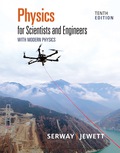
EBK PHYSICS FOR SCIENTISTS AND ENGINEER
10th Edition
ISBN: 8220106740163
Author: SERWAY
Publisher: CENGAGE L
expand_more
expand_more
format_list_bulleted
Concept explainers
Question
Chapter 20, Problem 40AP
(a)
To determine
The molar specific heat at constant volume if the molecules are linear.
(b)
To determine
The molar specific heat at constant volume if the molecules are nonlinear.
(c)
To determine
The high temperature molar specific heat at constant volume for a triatomic ideal gas of linear molecules.
(d)
To determine
The high temperature molar specific heat at constant volume for a triatomic ideal gas of nonlinear molecules.
(e)
To determine
The way by which the specific heat data is used to determine whether a triatomic molecule is linear or non-linear and check whether the data in Table
Expert Solution & Answer
Trending nowThis is a popular solution!

Students have asked these similar questions
3
Set
ба
||Axl
49.32
6b
71
Ay
22
Magnitude of A
Angle of A
24.04
Angle of -A
22
54
155.96
° (pos Ax) 204.04
° (neg Ax) 335.96
°
(pos Ax)
° (neg Ax)
115.77
° (pos Ax) 295.77
° (pos Ax)
-39
81
208.78
° (neg Ax) 28.78
°
(neg Ax)
3AA . not sure what i am getting wrong
Chapter 20 Solutions
EBK PHYSICS FOR SCIENTISTS AND ENGINEER
Ch. 20.1 - Two containers hold an ideal gas at the same...Ch. 20.2 - (i) How does the internal energy of an ideal gas...Ch. 20.3 - Prob. 20.3QQCh. 20.3 - Prob. 20.4QQCh. 20 - A spherical balloon of volume 4.00 103 cm3...Ch. 20 - A spherical balloon of volume V contains helium at...Ch. 20 - A 2.00-mol sample of oxygen gas is confined to a...Ch. 20 - Oxygen, modeled as an ideal gas, is in a container...Ch. 20 - A 5.00-L vessel contains nitrogen gas at 27.0C and...Ch. 20 - Prob. 6P
Ch. 20 - In a period of 1.00 s, 5.00 1023 nitrogen...Ch. 20 - A 7.00-L vessel contains 3.50 moles of gas at a...Ch. 20 - Calculate the change in internal energy of 3.00...Ch. 20 - Prob. 10PCh. 20 - In a constant-volume process, 209 J of energy is...Ch. 20 - A vertical cylinder with a heavy piston contains...Ch. 20 - A 1.00-L insulated bottle is full of tea at 90.0C....Ch. 20 - A certain molecule has f degrees of freedom. Show...Ch. 20 - You are working for an automobile tire company....Ch. 20 - Why is the following situation impossible? A team...Ch. 20 - You and your younger brother are designing an air...Ch. 20 - During the compression stroke of a certain...Ch. 20 - Air in a thundercloud expands as it rises. If its...Ch. 20 - Why is the following situation impossible? A new...Ch. 20 - Air (a diatomic ideal gas) at 27.0C and...Ch. 20 - Prob. 22PCh. 20 - Prob. 23PCh. 20 - Prob. 24PCh. 20 - Prob. 25PCh. 20 - The law of atmospheres states that the number...Ch. 20 - Prob. 27APCh. 20 - Prob. 28APCh. 20 - The dimensions of a classroom are 4.20 m 3.00 m ...Ch. 20 - Prob. 30APCh. 20 - The Earths atmosphere consists primarily of oxygen...Ch. 20 - Review. As a sound wave passes through a gas, the...Ch. 20 - Prob. 33APCh. 20 - In a cylinder, a sample of an ideal gas with...Ch. 20 - As a 1.00-mol sample of a monatomic ideal gas...Ch. 20 - A sample consists of an amount n in moles of a...Ch. 20 - The latent heat of vaporization for water at room...Ch. 20 - A vessel contains 1.00 104 oxygen molecules at...Ch. 20 - Prob. 39APCh. 20 - Prob. 40APCh. 20 - Prob. 41APCh. 20 - On the PV diagram for an ideal gas, one isothermal...Ch. 20 - Prob. 43APCh. 20 - Prob. 44APCh. 20 - Prob. 45CP
Knowledge Booster
Learn more about
Need a deep-dive on the concept behind this application? Look no further. Learn more about this topic, physics and related others by exploring similar questions and additional content below.Similar questions
arrow_back_ios
SEE MORE QUESTIONS
arrow_forward_ios
Recommended textbooks for you

 Physics for Scientists and Engineers: Foundations...PhysicsISBN:9781133939146Author:Katz, Debora M.Publisher:Cengage Learning
Physics for Scientists and Engineers: Foundations...PhysicsISBN:9781133939146Author:Katz, Debora M.Publisher:Cengage Learning Principles of Physics: A Calculus-Based TextPhysicsISBN:9781133104261Author:Raymond A. Serway, John W. JewettPublisher:Cengage Learning
Principles of Physics: A Calculus-Based TextPhysicsISBN:9781133104261Author:Raymond A. Serway, John W. JewettPublisher:Cengage Learning Physics for Scientists and Engineers, Technology ...PhysicsISBN:9781305116399Author:Raymond A. Serway, John W. JewettPublisher:Cengage Learning
Physics for Scientists and Engineers, Technology ...PhysicsISBN:9781305116399Author:Raymond A. Serway, John W. JewettPublisher:Cengage Learning College PhysicsPhysicsISBN:9781305952300Author:Raymond A. Serway, Chris VuillePublisher:Cengage Learning
College PhysicsPhysicsISBN:9781305952300Author:Raymond A. Serway, Chris VuillePublisher:Cengage Learning College PhysicsPhysicsISBN:9781285737027Author:Raymond A. Serway, Chris VuillePublisher:Cengage Learning
College PhysicsPhysicsISBN:9781285737027Author:Raymond A. Serway, Chris VuillePublisher:Cengage Learning


Physics for Scientists and Engineers: Foundations...
Physics
ISBN:9781133939146
Author:Katz, Debora M.
Publisher:Cengage Learning

Principles of Physics: A Calculus-Based Text
Physics
ISBN:9781133104261
Author:Raymond A. Serway, John W. Jewett
Publisher:Cengage Learning

Physics for Scientists and Engineers, Technology ...
Physics
ISBN:9781305116399
Author:Raymond A. Serway, John W. Jewett
Publisher:Cengage Learning

College Physics
Physics
ISBN:9781305952300
Author:Raymond A. Serway, Chris Vuille
Publisher:Cengage Learning

College Physics
Physics
ISBN:9781285737027
Author:Raymond A. Serway, Chris Vuille
Publisher:Cengage Learning